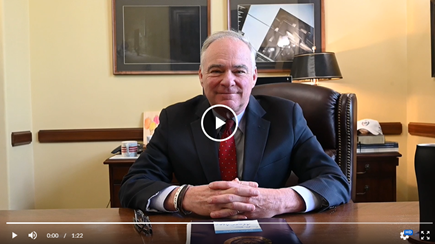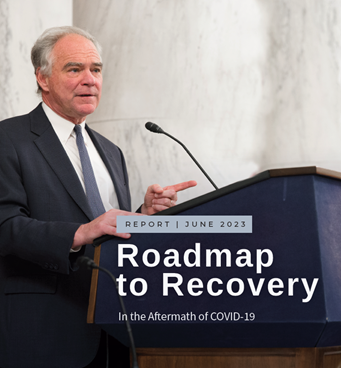VIDEO: As America Enters New Phase of COVID Comeback, Kaine Unveils Legislative Roadmap to Recovery
Report details plan to build on America’s COVID recovery progress, further improve the economy, health care, education, and public safety
WASHINGTON, D.C. – Following last month’s expiration of the national COVID emergency, U.S. Senator Tim Kaine today unveiled his Roadmap to Recovery, a legislative action plan to help America build on the progress made since the depths of the pandemic. The roadmap includes personal stories from Virginians in Hampton Roads and Northern, Southside and Southwest Virginia regarding the economy, health care, education, and public safety needs of communities across the Commonwealth, as well as an outline of steps Kaine is taking to chart a new chapter of recovery.

Click here to WATCH Kaine unveil his Roadmap to Recovery
“The last three years have been difficult for our whole country. But in the face of many challenges, unfathomable loss, economic tumult, and new demands on our health care system, Virginians’ strength—coupled with federal investments and support—have helped the Commonwealth make a comeback,” said Kaine. “As I travel throughout Virginia, I’m having great conversations with communities about how we can build on that progress to further strengthen our economy, safety, and health and education systems. This roadmap is about putting those ideas together to form an organized strategy for the next phase of our recovery.”

Click here to READ Kaine’s Roadmap to Recovery
Jobs and the Economy
To build on the economic progress supported by the CARES Act, the Inflation Reduction Act, the CHIPS and Science Act, the Bipartisan Infrastructure Law, the federal government’s recent annual budgets, and the American Rescue Plan Act, Kaine’s recovery agenda lays out steps he is taking to alleviate household financial pressures, expand access to affordable job training, and address worker shortages, including in the health care industry. Specifically, Kaine is zeroing in on:
- Lowering taxes on the middle class, including by reinstating the expanded Child Tax Credit and expanded Earned Income Tax Credit for childless workers.
- Raising the federal minimum wage.
- Passing his Fair Housing Improvement Act to prevent housing discrimination and improve families’ ability to find affordable housing.
- Strengthening investments in affordable housing and working to help more Americans achieve the American dream of homeownership.
- Expanding access to affordable, high-quality job training programs. As Julie from Norfolk said, “I tried to go back to school to advance my career, but a career certification program was going to cost me upwards of $20,000. With these barriers to education, I cannot secure a job that adequately provides for my family or prepares for our future.” Kaine’s bipartisan Jumpstart Our Businesses by Supporting Students (JOBS) Act would address this issue by extending Pell Grant eligibility to shorter-term job training programs to help Virginians like Julia afford the training they need to get good-paying jobs.
- Passing the Expanding Medical Education Act and the Supporting Our Direct Care Workforce and Family Caregivers Act, legislation Kaine is fighting for to support the recruitment, training, and retention of direct care and other health care workers—key sectors of local economies throughout Virginia.
Health Care
New demands introduced by the pandemic highlighted the importance of ensuring access to quality, affordable health care for all. Because no full recovery will be possible until Virginians’ health needs are met, Kaine is working to:
- Pass his Medicare-X Choice Act to build on the framework of Medicare and create a low-cost public option for health care that would put affordable care within reach for more Virginians.
- Pass his CARE for Long COVID Act to accelerate research and resources to address Long COVID and assist those who are suffering. This legislation would help Virginians like Rachel from Franklin—a panelist from Kaine’s first-of-its-kind in-person summit for providers treating Virginians living with Long COVID—who shared that she loved her career and was devastated to have to separate from her job due to Long COVID.
- Pass his Reproductive Freedom For All Act to codify the essential holdings of Roe v. Wade and protect women’s right to access abortion and contraception.
- Fight the substance use epidemic, by supporting prevention, treatment, and recovery services and ensuring that the health workforce and infrastructure is in place to deliver that support. Rick, a treatment provider in Abingdon, said, “There have been strides made in developing services, yet the system of care is still incomplete and behind the curve given rapid increases in addiction severity.” Kaine is working on legislation to ensure that there is adequate workforce and infrastructure available to support Virginia’s substance use epidemic recovery efforts.
In recognition of COVID’s unique burdens on Virginia’s health care workforce, the Roadmap to Recovery also outlines how Kaine successfully fought to pass his Dr. Lorna Breen Health Care Provider Act, legislation to reduce burnout and promote mental health among healers. The legislation was named in honor of Dr. Lorna Breen, a physician from Charlottesville who was working on the front lines of the pandemic in New York and died by suicide in the Spring of 2020.
Education
It’s clear from Kaine’s conversations with Virginians that more must be done to improve the quality of and access to education, including by providing accessible and affordable child care and addressing teacher shortages. As part of Kaine’s Roadmap to Recovery, he is fighting to:
- Address the rising costs of child care, which are keeping parents out of the workforce. At the same time, low wages in the child care industry are forcing child care workers to leave their field. Silke, a child care provider from Chantilly, said, “As Virginia families return to the workforce post-COVID, they need and deserve access to affordable, high quality early learning environments for their children. Without adequate funding to compensate our talented workforce, we can’t recruit and retain enough teachers to keep classrooms open and serve working families.” That’s why Kaine is leading the Child Care for Working Families Act, legislation to lower child care costs and boost child care worker wages.
- Improve shortages that are leaving Virginia’s K-12 schools stretched thin. Thomas, a superintendent from Stafford, said, “The national teacher shortage was apparent before the pandemic and now it is a crisis. The teaching profession is tough. With low compensation relative to training that has only gotten proportionally worse over time, long hours, and an often-unfriendly political landscape, many teacher preparation programs are under-enrolled or dry.” Kaine will soon reintroduce his bipartisan Preparing and Retaining Education Professionals (PREP) Act, legislation to address teacher and principal shortages, particularly in rural communities and to increase teacher diversity.
Public Safety and Criminal Justice Reform
Major public safety issues persist throughout Virginia and America, including gun violence and domestic threats from extremist organizations. To improve public safety, Kaine is working to pass:
- His Virginia Plan to Reduce Gun Violence Act, legislation to implement various measures—such as expanding background checks, establishing extreme risk protection orders, and preventing minors from accessing firearms—to strengthen federal gun safety laws and make our communities safer.
- Government funding bills that include greater funding for the Department of Justice’s Community Oriented Policing Services (COPS) program and Edward Byrne Memorial Justice Assistance Grant (Byrne JAG) program. The COPS program provides funding for local public safety agencies to expand crisis intervention teams and strengthen community crime prevention efforts, and the Byrne JAG program provides funding for state and local governments to target their most pressing needs, from law enforcement and crime prevention, to corrections and crime victims’ services.
- His Assault Weapons Ban of 2023 to reauthorize the assault weapons ban that expired in 2004, which led to a 183% increase in gun massacres and a 239% increase in gun massacre deaths.
- The Justice in Policing Act to eliminate unnecessary practices like chokeholds and no-knock warrants, end racial profiling, and ensure that police are held accountable for reckless behavior.
- His Disrupt Fentanyl Trafficking Act, legislation to direct increased federal attention to fentanyl trafficking by utilizing the tools of the Department of Defense and involving Mexico as an active partner to combat this crisis and disrupt Mexican cartel activity.
- The Domestic Terrorism Prevention Act to improve hate crimes reporting and expand assistance and resources for victims of hate crimes.
- His Cost of Police Misconduct Act, legislation that would require law enforcement agencies to report police misconduct related judgments or settlements (including court fees) to the Department of Justice.
###

